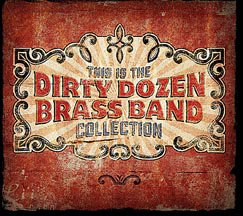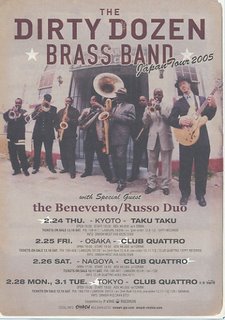the dirty dozen

for my birthday, my most fantastic wife provided me a surprise trip to see one of my favorites...the dirty dozen brass band. if you find yourself in new market, new hampshire, check out who is playing at the stone church meeting house...a nice venue
history: The jazz funeral is a tradition based on centuries old African ideology has, in modern times, become a sacred experience unique to Louisiana which began as early as the evolution of jazz itself. When a "jazz man" leaves the earth, there is first a viewing and service at the church followed by a march to the final resting place. En route to the cemetery, slow mournful dirges comfort the family, and once out of earshot, the elegies turn into a festive celebration of the recently departed. The Jazz Funeral is such an important cornerstone of life in New Orleans that an entire business model was established based on this tradition. Fraternal organizations known as Social and Pleasure clubs arose to provide burial insurance for the lower and middle class Black citizens who wanted to guarantee an appropriate send off to their loved ones. By the mid 1970s, the jazz funeral and the clubs that kept them going were in steep decline. The elder statesmen of New Orleans jazz were starting to fade away, and most of the younger generation were looking to forge ahead with their own musical tastes. But not all of the kids were turning a deaf ear to the old school.
IN 1977, the Dirty Dozen Social and Pleasure Club in New Orleans began showcasing a traditional Crescent City brass band. It was a joining of two proud, but antiquated, traditions at the time: social and pleasure clubs dated back over a century to a time when black southerners could rarely afford life insurance, and the clubs would provide proper funeral arrangements. Brass bands, early predecessors of jazz as we know it, would often follow the funeral procession playing somber dirges, then once the family of the deceased was out of earshot, burst into jubilant dance tunes as casual onlookers danced in the streets. By the late 70s, few of either existed. The Dirty Dozen Social and Pleasure Club decided to assemble this group as a house band, and over the course of these early gigs, the eight-member ensemble adopted the venue's name: the Dirty Dozen Brass Band.

